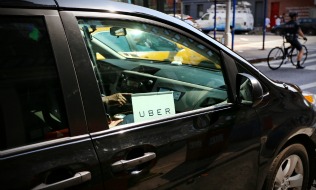
Toronto Uber drivers are joining the United Food and Commercial Workers Canada union to bargain for sick days and vacation days, as well as a guaranteed minimum wage.
During a media conference in Toronto on Wednesday, Pablo Godoy, the national co-ordinator for gig and platform-employer initiatives at UFCW Canada, said many drivers spoke of a “resounding feeling of continually being ignored by Uber” on issues they’ve brought to the company’s attention, including safety and being overworked.
“We’ve heard accounts of drivers regularly working over 100 hours simply to ensure they are able to keep up with the costs of driving for Uber while trying to make ends meet,” he said. The union also noted Uber doesn’t cover drivers’ fuel and repair costs.
Read: Foodora couriers attempting to unionize for better pay, benefits
While Godoy declined to provide a precise estimate of how many drivers the union had signed up, he said the number was in the “high hundreds.” He noted the union is continuing to sign cards and hasn’t yet filed for certification, but will represent members as soon as they join the union. Drivers won’t be required to pay union dues until the union is certified, he added.
According to a study by the Economic Policy Institute, most Uber drivers earn less than $10 an hour after their driving costs are subtracted. Ejaz Butt, an Uber driver who was one of the workers behind the move to unionize, said the drivers wants to receive a guaranteed minimum wage of $15 per hour, as well as sick days, vacation days and breaks. He also said drivers are often in the car for several hours without breaks to eat and use the restroom.
“These are human rights and Uber drivers deserve this basic level of respect,” said Butt.
Read: Ontario Uber drivers launch class action in bid to be considered employees
Gig economy companies like Uber that classify workers as independent contractors are “circumvent[ing] labour laws under the guise of being a tech company,” said Godoy. “In reality . . . Uber is the employer, Uber drivers are its employees and the Uber app itself is simply a management tool.”
Classifying drivers as independent contractors rather than employees allows Uber to avoid paying into the Canada Pension Plan and employment insurance for its workers. Godoy told Benefits Canada the union would seek to have drivers classified as employees, but is open to a potential range of options, including the classification of dependent contractor.
The move towards unionization is also highlighting the need for a change to the company’s driver rating system. Drivers say the rating system, which allows passengers to rate drivers on a scale of one to five stars after the ride, encourages them to accept unreasonable demands from riders that could put both driver and passenger at risk, all to ensure they receive a five-star rating. Drivers who receive lower ratings can face being booted off the platform.
Read: Canada’s growing gig workforce highlights need for portable benefits plan: report
“Without high ratings we risk losing our accounts and putting our livelihoods in jeopardy,” said Butt during the media conference. “Uber’s business model ensures we are stretched to the limit or face dismissals. This has created a race to the bottom for drivers, with many of us disregarding road safety practices and our own human dignity to keep our accounts, keep the customer happy and keep Uber wealthy.”
Uber didn’t respond to a request for comment by time of publication.
